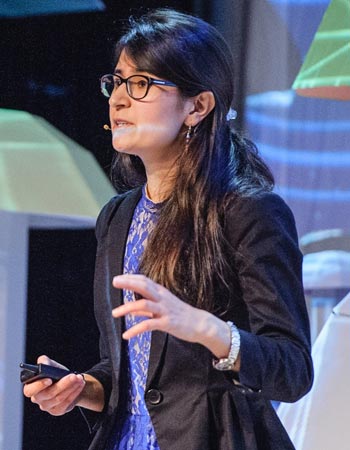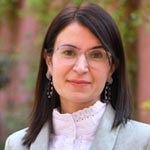Sustainability Education – Dr Fozia Parveen
 Fozia Parveen is an Assistant Professor at AKU’s Institute for Educational Development in Pakistan and focuses on environment and climate change education.
Fozia Parveen is an Assistant Professor at AKU’s Institute for Educational Development in Pakistan and focuses on environment and climate change education.
How did you get started on the path to sustainability?
I had the luxury of being born in a small village near Gilgit in Northern Pakistan. Also called the Third Pole of the world, it is immensely rich in natural resources and culture. Walking barefoot on grass, dipping my feet in natural streams, and opening my window to the view of the mountains was an everyday experience for me. Living in harmony with nature was one of the principles we lived by. However, I am aware that I grew up in a natural and social system that was completely unique and an experience that many people living in cities don’t have easy access to.
When choosing a career path, I found the subject of environment quite fascinating because of how interdisciplinary it was, and how it included the element of actionable change in society. When I moved to the city for my higher education, something inherently changed for me. Seeing poverty, pollution, and disregard for the environment at a bigger scale opened my eyes to this different environmental reality that was so disconnected from my experience growing up. I became even more aware of the importance of green spaces, clean air and water in my life.
Was there an element of environmental activism that you channeled for change?
When I was a student, I loved including an element of practicality in everything I did. This was a part of my personality that I discovered while in university. For example, if we were asked to record medicinal plants, we didn't just rely on the Internet to find information, we actually went to a Hakeem (doctor of traditional medicine) in Rawalpindi to learn about the local plants in the area and their value. In addition, studying at a government university, I was provided many opportunities to engage in multi-stakeholder policy dialogues which I think was a very good exposure at that age.
It was in my graduate studies that I actively started working with communities and speaking in conferences and advocating in online events. Even though I have been engaged in many active spaces throughout my education and career, I wouldn't necessarily call myself an activist; a change maker maybe.
What is your current role and the impact you hope to have?
When I came back to Pakistan after my PhD, I thought I now had a license to bring about bigger systemic changes. But when I started working in communities, I realized that bringing about change is not an easy process. You advocate, you educate people, but that does not necessarily translate into behavior change. I think it requires not just education, awareness, and policy interventions, but an inherent ability to create empathy with nature, something we call environmental sensitivity.
While teaching undergraduate courses on environment, I realized that awareness at the higher education level can create some leaders, but it if you want to bring about change at a much larger scale, like I do, then you have to start environmental education and sensitization from a very young age. AKU-IED is a great platform to do that. Because we educate teachers, and these teachers will go back to their schools and communities to teach young kids about climate change and environment. This way the impact is multiplied,
In terms of interventions, I am very proud of the Climate Change and Environmental Sustainability Module, an open and free resource, that has been so well received. It has come to my knowledge that it has reached the Environmental Protection Agencies of Gilgit and Khyber Pakhtunkhwa in addition to a couple of school systems including AKES. In addition, the overwhelming response I received from parents is a validation of the fact that this is much needed. It is my hope and desire that climate change and environmental sustainability education becomes a nation-wide campaign and year-round agenda.
Why is sustainability education important today?
I’m part of the generation that not only was taught about research on how climate change will impact the planet but who is seeing all of those predictions coming true in our own lifetime. My sense of urgency comes from the fact that everything I was taught in theory is hitting us and the planet right now. This is because the people in power didn't do anything. Individuals and communities didn't do anything. As much as we talk about changes in the system, which I believe are necessary, we need to mainstream environmental action by making it a part of the everyday narrative - in schools, media, and even religious sermons.
I believe in countries like Pakistan, environmental education is urgently needed because our planet is on fire and we are the first ones to get affected, severely. I think that it is not too late for us to bring change at individual, community, or global scale.
For me passing on this message and ensuring that our future generations have a livable planet is important. It is an important part of my identity, my faith, my culture and my being.
How do you keep yourself motivated? Is there anyone who inspires you?
When I started this work, I didn't have many local role models or leaders I could look up to. So, I became a changemaker myself. I think my passion, optimism, and perseverance doesn't allow me to give up. We have lived long enough in spaces of inaction. About time we change that.
For me, happiness comes from doing small things like creating scholarship, training students, speaking in workshops.
As far as people who have inspired me goes, I'm very fond of David Attenborough and his approach of educating the masses by exploring natural environments. I think the documentaries he makes are so articulate and inspirational. I learned from him to not give up - he's quite old but still working for this cause. In addition, I think Greta is incredible in how she's given a wakeup call that you don’t have to be a grown up or an expert to take and demand climate action.
What makes you hopeful about sustainability at AKU?
It inspires me that universities are now stepping up. I have grown up in a space of inaction, so for me, any environmental action is good action, no matter how small. The fact that AKU has a whole plan to decarbonize and get to net zero is a very positive step and will help in scaling and expanding this initiative beyond the University walls.
When I see institutions like ours going green, I wonder what more we can do and where else we can contribute. I hope that the example of AKU will be replicated by all other universities in Pakistan and people will take inspiration from us. That way we are not just telling our students that a sustainable planet is important, we'll also show them how educational institutions can play a role to make that a reality.
What advice would you give someone who is interested in pursuing this field?
I would say start small but start today and always lead by example and do not give up. One thing I've learned in all these years is that you cannot do it alone - you need people by your side. If you need advice, you will find that there are many people like me who will be happy to engage, interact, and train, so don’t be afraid to reach out.
Find opportunities to intern, volunteer, and build communities of change. Push your school or university to go green. Whichever table you have a seat at, actively advocate for change but most importantly be the change.

Dr Fozia Parveen

